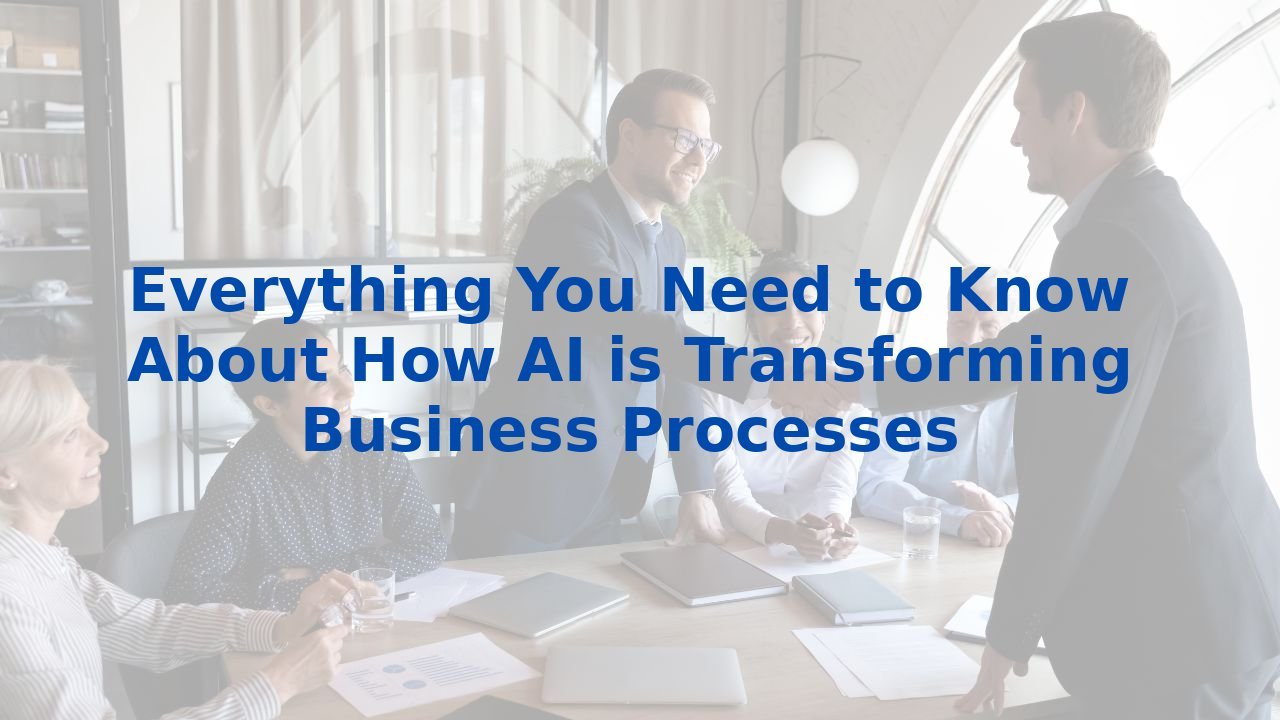Everything You Need to Know About How AI is Transforming Business Processes
Everything You Need to Know About How AI is Transforming Business Processes
Introduction
In an ever-evolving business landscape, organizations are faced with the relentless pursuit of efficiency and productivity. Enter Artificial Intelligence (AI)—a game-changer that is revolutionizing the way businesses operate. By transforming traditional business processes, AI is empowering organizations to not just keep pace but to lead in their industries. This article explores how AI enhances various business processes, the immense benefits it offers, and the critical importance of training employees to harness its potential.
1. Process Optimization and Automation
At the heart of business efficiency lies process optimization. AI significantly elevates this aspect by automating routine tasks that typically consume valuable time and resources. Through machine learning and deep learning algorithms, AI analyzes historical data to unveil patterns and dependencies that might otherwise go unnoticed. This capability allows companies to simulate scenarios, forecast outcomes, and identify bottlenecks in their processes, leading to a leaner, more cost-effective operational model.
2. Real-Time Monitoring and Process Mining
The digital age demands agility, and AI delivers through real-time process mining. Organizations can now monitor their business processes as they unfold, receiving immediate updates on performance status. This capability empowers decision-makers to intervene swiftly when issues arise or when opportunities beckon. By analyzing data from various systems like CRM or ERP, AI can model processes and highlight deviations from established norms, allowing for continuous improvement.
3. Enhanced Decision-Making
Decision-making is an art, and AI is the brush that can enhance it. By processing both structured and unstructured data from myriad sources, AI equips decision-makers with the comprehensive information necessary to navigate complex business environments. The ability to simulate alternative scenarios offers invaluable insights, enabling leaders to make informed decisions while considering potential risks and impacts. The result? A more agile and strategic approach that positions the organization for ongoing success.
4. Predictive Analytics and Risk Management
Predictive analytics is where AI truly shines. By identifying patterns and trends within historical data, organizations can anticipate future outcomes and proactively address challenges before they escalate. This foresight is crucial for adapting to market fluctuations and consumer demands. By adjusting processes based on these predictions, businesses can seize opportunities and mitigate risks, ensuring they remain ahead of the curve.
5. Customer Service Optimization
In the realm of customer service, AI is redefining the customer experience. AI-powered chatbots provide immediate responses to basic customer inquiries, freeing up human agents to tackle more complex issues. Feedback analysis enables organizations to pinpoint areas for improvement, while AI can systematize incoming requests to ensure they are addressed efficiently. The result is a seamless customer experience that fosters loyalty and drives growth.
6. HR and Recruitment Automation
The hiring landscape is changing, and AI is at the forefront of this evolution. AI streamlines recruitment processes by automating initial assessments and identifying the best candidates. This not only reduces the time spent on interviewing but also enhances the quality of hires. Furthermore, AI aids in personalizing career paths and identifying attrition risks, thus enriching the overall employee experience.
7. Sales Process Enhancement
Sales teams benefit immensely from AI-driven enhancements. Automating administrative tasks, recommending optimal sales channels, and suggesting upsell opportunities are just a few of the ways AI empowers sales professionals. By prioritizing leads and personalizing sales journeys, businesses can enhance their sales processes, improve consistency, and drive revenue growth.
The Benefits of Training Employees for AI
While AI holds monumental potential, its effectiveness hinges on one crucial element: the people behind it. Training employees to adeptly utilize AI technologies is essential. Such training equips your workforce to:
- Understand AI-driven tools: Empower employees with the knowledge needed to navigate AI technologies seamlessly.
- Operate AI systems: Ensure that employees can effectively engage with AI tools for automation and data analysis.
- Identify AI-driven insights: Train employees to extract and interpret valuable insights generated by AI, enhancing their roles.
- Adapt to changing processes: As AI evolves, adaptable employees can pivot and flourish in new environments.
By investing in training initiatives, organizations can unlock the full potential of AI, aligning their workforce with innovative processes that drive success.
Conclusion
AI is not just a technological advancement; it’s a transformative force reshaping business processes across industries. From enhancing decision-making and optimizing customer service to reinforcing sales strategies and automating HR functions, the benefits are profound. To truly harness the power of AI, organizations must not only embrace its implementation but also prioritize employee training. In doing so, they will secure a competitive edge and prepare for a future where efficiency and innovation reign supreme.



